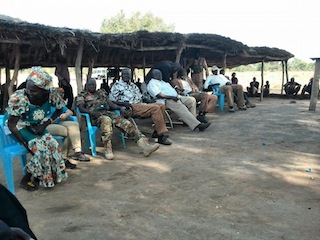Lakes: Pakam elders and MPs launch reconciliation effort
March 24, 2014 (RUMBEK) – Community and traditional leaders in Lakes’ state’s Rumbek North county have launched a reconciliation process in a bid to ease tensions between two clans who have been fighting each other over the past week.

On 10 March, fighting flared at the Yhaga cattle camp between members of the Gaak and Manuer sub-clans of the Dinka ethnic group, reportedly over a dispute about a girl.
Nine people were killed and another four suffered gunshot wounds.
Marik Nanga Marik, an MP in the Lakes state parliament, described the incident as “regrettable”, saying efforts were being made by traditional leaders to calm tensions in the area.
Last week’s clashes are believed to have been the first time youth pastoralists from the Gaak and Manuer sub-clans had turned on each other.
Peter Mathiang Mayom, a student representative, described the reconciliation meeting as productive. The Gaak and Manuer clans have reinstated their confidence to co-exist peacefully, he said.
A meeting was held in Rumkoor on Friday in a bid to to convince Gaak and Manuer youth from engaging in any further clashes.
“They agreed to coexist in life without further revenge,” he said.
Mathiang added that after they elders and youth from town intervened the pastoralist youth had agreed to return to their normal life cycle and to stay together in one cattle camp.
The meeting resolved to worked for “stability and togetherness as brothers”.
Maluong Malueth, a pastoralist youth representing the Manuer clan, said that “it was not our intention to fight Gaak but unintentional and we shall respect all those instruction.”
Lakes state’s authorities have become increasingly isolated since caretaker military governor Maj-Gen Matur Chut Dhuol took over last year after his elected predecessor was removed last year.
Traditional chiefs, students and activists have called on president Salva Kiir to remove Dhuol, but public demands have so far been overlooked.
Under South Sudan’s constitution, an election should be held within three months in the event that the president removes a governor from office.
However, in the three South Sudanese states where governors were removed last year this has yet to occur.
(ST)
